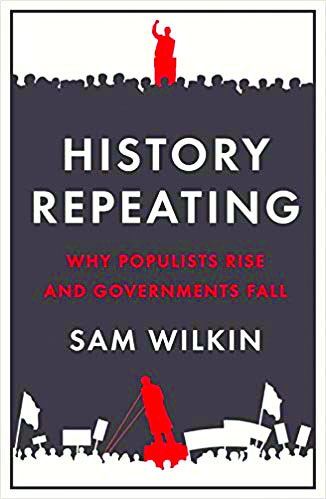In History Repeating, Sam Wilkin unearths the patterns entrenched in the history of the world and shows how even critical incidents and revolutions carry a sense of déjà vu. But he also says that it’s ultimately we who decide, writes TANYA MALIK
As the common populace continues to become more aware and invested in the public sphere, and unprecedented developments continue to take place at the highest political levels, History Repeating by political risk analyst Sam Wilkin is a timely intervention to examine the simultaneous growth of the process of political mobilisation as well as the rise of populism and the intimate relationship between them. With one keen eye on history and another on the events happening around us, the book is a handy guide to ace the political flux of today and prepare ourselves better for the times to come. After all, as Wilkin quips, “The historical patterns covered in this book will influence our future, but we determine it.”
Since time immemorial, regimes have been burned to the ground, they have been replaced (for better or worse), popular rebellions have become revolutions, great leaders have emerged and exiled, and newer social classes have come to light. From grand arrivals to disgraced exits, from coups to uprisings, from political intrigue to statesmanship — history is replete with rich examples of such incidents that have and in several instances, still continue to shape the destiny of nations.
But what does the toppling of a government or unrest in the public of a particular state with specific local factors at play mean for other countries or the global political scene in general?
What is the root cause of political erosion and what conditions facilitate it? Is there a pattern to look for? Is history actually repeating itself everywhere with just slight variations? Which precious lessons from our past are awaiting (re-)discovery?
Traversing the hits and misses across various forms of regimes and leadership in places as diverse as Thailand, Russia, Iran, Argentina and America, the book examines the patterns in rise and fall of the governments, the unstable conditions that lead to political turmoil and pave way for the rise of populism. This delightful journey culminates closer home with the last chapter being a dedicated guide to examine if your own country might be doomed and on the path of decline!
Populism is defined as the support for the concerns of ordinary people, the quality of appealing to or being aimed at ordinary people. One wonders then, if the rise of populist politicians appealing to the collective conscience of common citizenry would bring genuine advancement and change. Or are we missing something here?
Are these populists really the messiahs of the common people or just another bunch of opportunists that bulldozed their way to power and perks? Is there really an attempt at genuine reform or are the same well-versed tricks being offered again, albeit in new packaging? What sort of people make a good government? Which type of government is the best? Can politicians of any hue be trusted to work selflessly for the welfare of people? Is their empathy with the common class real? Or is that too just a well-veiled ruse for self-advancement only?
“Populists often come to power by mobilising politically disaffected non-voters; populists can gain from economic turmoil, which discredits the parties in power; populists can thrive in a polarised environment, because they find it easy to pick up support from across the political spectrum,” says the book. When democracies are plagued with lack of responsiveness (‘representation gap’) and distrust in political leaders, it becomes easier for populists to make claims about broken political systems and claim votes to win, it argues.
Also, high levels of inequality in the society and mobilisation of selective subgroups of population based on identity markers like caste, language and colour, pose a serious challenge to stability. Also, mobilisation of one group often results in counter rising of another group and we’re looking at perfect conditions for a full-blown political turmoil. However, historical evidence also points out to the resilience of democracies, where nations and its people have endured much more to uphold their democratic spirit.
So, can we expect clarity from this chaos? Can discontent be turned around for good? How can the political structures be saved from crumbling? In this context, the author aptly highlights the significance of political reforms and sound governance in improving the quality of politics and also maintaining peace and continuity in the society. The book says, “Some of the main elements of the quality of governance are the effectiveness of the government bureaucracy, the quality of regulation and economic policy, the rule of law, control of corruption and the maintenance of public order. Countries that do well in these areas tend to be far less likely to suffer violent revolution (or, indeed any kind of serious political violence).”
Indeed, no two countries can possibly have the exactly same political experiences, conditions, and criteria defined by social scientists fail routinely, several new factors are discovered and time-tested theories discredited, as nations continue to chart their own unique course. But this uncertainty is precisely why it necessitates the need to talk and examine these questions and concepts, which may very well be significant takeaway points from where the much-needed discussion on political discourse today can be taken forward and provide insights on how to engage with the leadership in a wholesome and effective manner.
With humour strewn around aplenty, this is not a drab political treatise. Instead, it is quite an engaging read for all — serious as well as general readers of the genre. Picking up anecdotes from some of the most riveting events of political churning from the recent past, and weaving them in an easy, conversational language, Wilkin manages to deliver an erudite book on politics which covers the past, the present and the interesting times to follow.


























